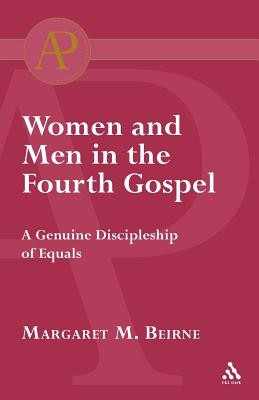
- We will send in 10–14 business days.
- Author: Margaret Beirne
- Publisher: CONTINNUUM 3PL
- ISBN-10: 0567042502
- ISBN-13: 9780567042507
- Format: 13.7 x 21.3 x 2 cm, softcover
- Language: English
- SAVE -10% with code: EXTRA
Reviews
Description
Fourth gospel presents the reader with an early christian text in which women and men are treated as "a discipleship of equals" as this term is broadly understood in the work of Elisabeth Schussler Fiorenza but qualified with respect to her discussion of the meaning of 'equality' when applied to gender. Specifically, the gospel contains six examples of "gender pairs" of characters (a widely-accepted lukan feature). The members of each pair are portrayed in a parallel or contrasting faith encounter with the Johannine Jesus which is of substantial theological importance to the gospel's stated purpose (John 20:31). The six pairs are the mother of Jesus (2:1-11) and the royal official (4:46-54); nicodemus (3:1-12) and the samaritan woman (4:4-42); the man born blind (9:1-41) and Martha (11:1-54); Mary of Bethany and Judas (12:1-8); the mother of Jesus and the beloved disciple (19:25-27); Mary Magdalene (20:11-18) and Thomas (20:24-29).
EXTRA 10 % discount with code: EXTRA
The promotion ends in 19d.19:34:09
The discount code is valid when purchasing from 10 €. Discounts do not stack.
- Author: Margaret Beirne
- Publisher: CONTINNUUM 3PL
- ISBN-10: 0567042502
- ISBN-13: 9780567042507
- Format: 13.7 x 21.3 x 2 cm, softcover
- Language: English English
Fourth gospel presents the reader with an early christian text in which women and men are treated as "a discipleship of equals" as this term is broadly understood in the work of Elisabeth Schussler Fiorenza but qualified with respect to her discussion of the meaning of 'equality' when applied to gender. Specifically, the gospel contains six examples of "gender pairs" of characters (a widely-accepted lukan feature). The members of each pair are portrayed in a parallel or contrasting faith encounter with the Johannine Jesus which is of substantial theological importance to the gospel's stated purpose (John 20:31). The six pairs are the mother of Jesus (2:1-11) and the royal official (4:46-54); nicodemus (3:1-12) and the samaritan woman (4:4-42); the man born blind (9:1-41) and Martha (11:1-54); Mary of Bethany and Judas (12:1-8); the mother of Jesus and the beloved disciple (19:25-27); Mary Magdalene (20:11-18) and Thomas (20:24-29).


Reviews